
Ralph C. Merkle is an American computer scientist and mathematician. He is one of the inventors of public-key cryptography, the inventor of cryptographic hashing, and more recently a researcher and speaker on cryonics.
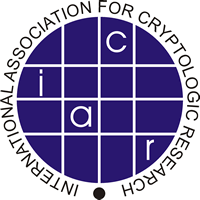
The International Association for Cryptologic Research (IACR) is a non-profit scientific organization that furthers research in cryptology and related fields. The IACR was organized at the initiative of David Chaum at the CRYPTO '82 conference.

Vincent Rijmen is a Belgian cryptographer and one of the two designers of the Rijndael, the Advanced Encryption Standard. Rijmen is also the co-designer of the WHIRLPOOL cryptographic hash function, and the block ciphers Anubis, KHAZAD, Square, NOEKEON and SHARK.
Don Coppersmith is a cryptographer and mathematician. He was involved in the design of the Data Encryption Standard block cipher at IBM, particularly the design of the S-boxes, strengthening them against differential cryptanalysis. He also improved the quantum Fourier transform discovered by Peter Shor in the same year (1994). He has also worked on algorithms for computing discrete logarithms, the cryptanalysis of RSA, methods for rapid matrix multiplication and IBM's MARS cipher. He is also a co-designer of the SEAL and Scream ciphers.
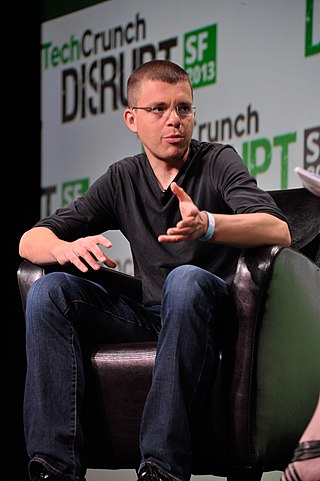
Maksymilian Rafailovych "Max" Levchin is a Ukrainian-American software engineer and businessman. In 1998, he co-founded the company that eventually became PayPal. Levchin made contributions to PayPal's anti-fraud efforts and was the co-creator of the Gausebeck-Levchin test, one of the first commercial implementations of a CAPTCHA challenge response human test.
Paul Carl Kocher is an American cryptographer and cryptography entrepreneur who founded Cryptography Research, Inc. (CRI) and served as its president and chief scientist.
Wang Xiaoyun is a Chinese cryptographer, mathematician, and computer scientist. She is a professor in the Department of Mathematics and System Science of Shandong University and an academician of the Chinese Academy of Sciences.

Ben Laurie is an English software engineer. Laurie wrote Apache-SSL, the basis of most SSL-enabled versions of the Apache HTTP Server. He developed the MUD Gods, which was innovative in including online creation in its endgame.
Phillip Rogaway is an American cryptographer who is a professor of computer science at the University of California, Davis. He graduated from Beverly Hills High School, and later earned a BA in computer science from UC Berkeley and completed his PhD in cryptography at MIT, in the Theory of Computation group. He has taught at UC Davis since 1994. He was awarded the Paris Kanellakis Award in 2009 and the first Levchin Prize for Real World Cryptography in 2016. Rogaway received an NSF CAREER award in 1996, which the NSA had attempted to prevent by influencing the NSF.

The Donald E. Knuth Prize is a prize for outstanding contributions to the foundations of computer science, named after the American computer scientist Donald E. Knuth.
Victor Saul Miller is an American mathematician as a Principal Computer Scientist in the Computer Science Laboratory of SRI International. He received his B.A. in mathematics from Columbia University in 1968, and his Ph.D. in mathematics from Harvard University in 1975. He was an assistant professor in the Mathematics Department of the University of Massachusetts Boston from 1973 to 1978. In 1978 he joined the IBM 801 project in the Computer Science Department of the Thomas J. Watson Research Center in Yorktown Heights, New York, and moved to the Mathematics Department in 1984. From 1993-2022 he was on the Research Staff of Center for Communications Research (CCR) of the Institute for Defense Analyses in Princeton, New Jersey, U.S. In 2022 he was a Research Scientist in that Statistics and Privacy Group of Meta Platforms.
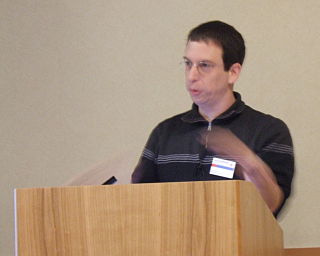
Dan Boneh is an Israeli–American professor in applied cryptography and computer security at Stanford University.
Mihir Bellare is a cryptographer and professor at the University of California San Diego. He holds a Bachelor of Science degree from the California Institute of Technology and a Ph.D. from Massachusetts Institute of Technology. He has published several seminal papers in the field of cryptography, many of which were co-written with Phillip Rogaway. Bellare has published a number of papers in the field of Format-Preserving Encryption. His students include Michel Abdalla, Chanathip Namprempre, Tadayoshi Kohno and Anton Mityagin. Bellare is one of the authors of skein.
Nigel Smart is a professor at COSIC at the Katholieke Universiteit Leuven and Chief Academic Officer at Zama. He is a cryptographer with interests in the theory of cryptography and its application in practice.

Ueli Maurer is a professor of cryptography at the Swiss Federal Institute of Technology Zurich.
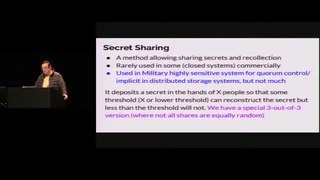
Mordechai M. "Moti" Yung is a cryptographer and computer scientist known for his work on cryptovirology and kleptography.

Tal Rabin is a computer scientist and Professor of Computer and Information Science at the University of Pennsylvania. She was previously the head of research at the Algorand Foundation and the head of the cryptography research group at IBM's Thomas J. Watson Research Center.
Jan Leonhard Camenisch is a Swiss research scientist in cryptography and privacy and is currently the CTO of DFINITY. He previously worked at IBM Research – Zurich, Switzerland and has published over 100 widely cited scientific articles and holds more than 70 U.S. patents.
Anna A. Lysyanskaya is an American cryptographer known for her research on digital signatures and anonymous digital credentials. She is the James A. and Julie N. Brown Professor of Computer Science at Brown University.
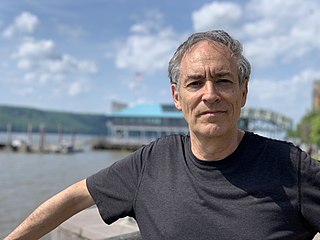
Hugo Krawczyk is an Argentine-Israeli cryptographer best known for co-inventing the HMAC message authentication algorithm and contributing in fundamental ways to the cryptographic architecture of central Internet standards, including IPsec, IKE, and SSL/TLS. In particular, both IKEv2 and TLS 1.3 use Krawczyk’s SIGMA protocol as the cryptographic core of their key exchange procedures. He has also contributed foundational work in the areas of threshold and proactive cryptosystems and searchable symmetric encryption, among others.










